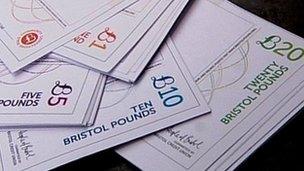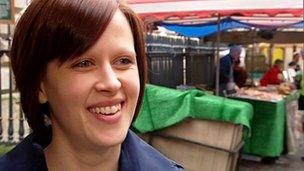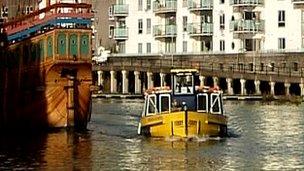'Bristol Pound' currency to boost independent traders
- Published

Bristol's new currency will be printed, but also traded online and with mobile phones.
The Euro is in trouble, the world's financial system is in turmoil. Is this the perfect time for cities to go it alone, and print their own money?
A group of independent traders in Bristol are launching their own currency, with the backing of the council and a credit union.
The "Bristol Pound" will be printed in notes, and also traded electronically.
There are other local currencies in the UK, but this is the first which can be used to pay local business taxes.
Ciaran Mundy, the director of the Bristol Pound, explained the concept behind the currency.
"Big companies just hoover up money from a local area," he told me.
"Money goes into their financial system and typically out into London and into the offshore sector."
Corporate challenge
But by definition, Bristol pounds must stay in the city. Spend a tenner in a Bristol bakery, and they must use it to pay their suppliers or staff. In turn, those companies will have to use the money within the local economy.
"We'll be driving more business to independent traders, and ensuring the diversity of our city, which is one of the things people love about Bristol," Mr Mundy said.
Already more than 100 firms are signed up. A family bakery, the Tobacco Factory Theatre, the Ferry company, dozens of small cafes - even Thatcher's Cider will accept Bristol pounds.
So how will it work?
They will print notes in £1, £5, £10 and £20 denominations. A Bristol pound will be worth exactly £1 sterling.
People will open an account with the Bristol Credit Union, which is administering the scheme, and for every pound sterling they deposit, they will be credited one Bristol pound.
This money can then either be cashed, or used electronically to pay bills online or even with a mobile phone.
Since the money is held by the credit union, which has FSA backing, it will have the same protection as any other deposit account. The standard government scheme guarantees up to £85,000 per person.
Bristolians are being challenged to help design the new notes. The organisers have already created a logo, and produced security features to counter forgery.
There is a silver hologram design, a gold foil strip with serial numbers embedded, and other features which are impossible to reproduce.
But whose face should be on the notes? That is down to Bristolians.
Small change?
"Bristol's own currency should reflect the values and the lives of people who live here," explained the designer, Adele Graham.
"We're open to any suggestions. It could be famous people, but it can be any design at all which Bristolians feel represents their city."
Local people can submit their ideas on the Bristol Pound's website, external. The competition will run until the end of February, and the notes will be launched in May.

Adele Graham wants Bristolians to design their own money
But will the Bristol Pound really take off?
Most local currencies have remained small. The Totnes Pound was the first to launch, in Devon in 2006, and has 70 traders involved.
Eighteen months ago Stroud, in Gloucestershire, starting printing its own currency, but to date no more than 30 firms are taking the money.
Bristol's organisers point to two key differences: online banking, and council support.
Since the scheme is run by a bona fide financial institution, the Bristol Credit Union, traders can pay each other large amounts of money at the click of a button.
Also unique is the ability to pay local business rates in local currency. The council leader, Councillor Barbara Janke, is fully behind the scheme.
She told me: "This is a chance to demonstrate the economic resilience of the city.
"We want to make it as easy as possible for people to use the Bristol Pound."
'No real boost'
Paying business rates in Bristol pounds means firms need not worry about being stuck with thousands of pounds they can't spend, if their own suppliers refuse them.
Naturally, there are sceptics. Will people find it inconvenient to carry two kinds of notes in their pockets? Will it be more than a gimmick?
Interestingly, it is the prospect of success that worries some the most.
Ben Yearsley understands money. Big money. He is an investment strategist at Hargreaves Lansdown, the Bristol finance house which looks after £22bn of people's savings.

Ship-shape and Bristol funded: the local ferry firm is one of 100 companies already signed up
He points out that the scheme will do nothing to help Britain's economic recovery.
"This won't boost spending," he explained. "It will merely move money from one sector to another, from national firms to local ones."
And if the Bristol Pound really works, Mr Yearsley worries that big national firms may be put off.
"A lot of people work for the national companies, and you may actually cause an increase in unemployment. Worse, there may be a brake on investment in the city."
But the organisers think he worries too much.
Stephen Clarke, a local lawyer who is working for the new currency for nothing, said: "This is not an attack on national chains.
"We just want to preserve our local independents, and you can see how hard it is for them at the moment."
Whenever local shops close down, and supermarkets or chain stores open, there are complaints about "cloned high streets" and "chain store Britain".
Well, now if people really want to support independents, they can quite literally put their money where their mouth is.
I've been investigating local currencies for Inside Out West, and you can see my film on BBC One on Monday Feb 6th, at 7:30pm or on the iPlayer after that.
- Published7 September 2011